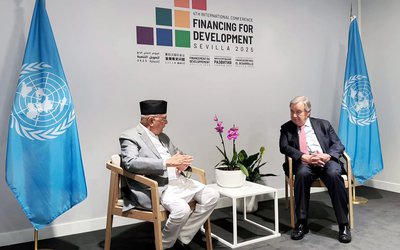
International Commission of Jurists (ICJ) said that proposed Nepal’s Transitional Justice Bill disregards domestic and International Legal Standards
ICJ demanded to amend the proposed Nepal’s Transitional Justice Bill to protect victims, not abusers.
According to a press release issued by ICJ, a bill to amend Nepal’s transitional justice legislation does not fully meet the country’s domestic law or international legal obligations and will not provide justice for victims if adopted in its current form, Amnesty International, Human Rights Watch and the International Commission of Jurists said today.
The Bill for the Amendment of the Investigation of Enforced Disappeared Persons, Truth and Reconciliation Commission Act (2014), widely referred to as the transitional justice bill, was presented to parliament on 19 March 2023. The bill, if adopted as currently formulated, will not adequately provide for the effective prosecution of serious crimes under international law. Moreover, the government has failed to adequately consult conflict victims about the content of the draft legislation, seriously undermining the credibility of its current approach. The bill should not be adopted in its current form; instead, it should be revised to comply with Nepal’s Supreme Court rulings and international human rights law and standards.
In addition, the revision process should ensure adequate consultation with conflict victims about the content of the proposed legislation. “Key provisions of this bill appear to be designed to shield alleged perpetrators from prosecution for some of the most serious crimes under international law,” said Dinushika Dissanayake, Amnesty International’s deputy regional director for South Asia. “If it is rushed through parliament without significant changes, it cannot be the basis for a process that has the support of conflict victims, nor legal credibility at home or abroad.” The latest draft, presented to parliament by the recently elected coalition government headed by the Maoist leader Pushpa Kamal Dahal, fails to address most of the concerns already identified in July 2022 by victims’ groups, lawmakers and human rights experts with an earlier version of the bill. At that time, a parliamentary committee had begun work on necessary changes, but parliament was dissolved before the legislative proposals came to a vote ahead of elections that were held last November.
Despite this, the government, which includes the Nepali Congress party as a major coalition partner, reportedly plans to adopt the current draft without amendments through an “expedited” process. Both the Maoist armed group and government security forces committed serious human rights violations and violations of international humanitarian law amounting to crimes under international law during the armed conflict in Nepal from 1996 to 2006.
The Comprehensive Peace Agreement that ended the war included a commitment to set up a truth and reconciliation commission “to investigate [the] truth about people seriously violating human rights and involved in crimes against humanity.” However, successive governments, which have been led in turn by all the major political parties, have blocked efforts at truth and justice. Some aspects of the current bill can be the basis for progress, which is long overdue and desperately needed, the groups said.
For example, the bill guarantees the right to reparation and interim relief for some victims who were left out of earlier relief packages. It also guarantees the right of the families of “disappeared” persons to their relative’s property. The bill also mandates Nepal’s Truth and Reconciliation Commission to study the root causes and impact of the conflict and recommend institutional reforms. However, if adopted as currently formulated, the bill would allow many people allegedly responsible for abuses amounting to crimes under international law to evade justice. It would result in the Nepali justice system continuing to abandon many victims and survivors, some of whom have waited two decades for truth and redress.
There have been almost no successful prosecutions of serious crimes under international law since the conflict ended in 2006|. The Supreme Court in 2015 struck down a number of sections of the 2014 law establishing Nepal’s Truth and Reconciliation Commission (TRC) and the Commission of Investigation on Enforced Disappeared Persons (CIEDP), in particular because they were empowered to grant amnesties to perpetrators of serious crimes under international law. Under the latest proposals, the two commissions would investigate crimes committed during the conflict and “serious violations of human rights” would be prosecuted in a special court.
However, the definition of “serious violations of human rights” – which includes rape, enforced disappearance, “cruel or inhuman torture,” and “killing of somebody after cruel torture or killing of somebody in a brutal manner” – excludes numerous crimes under international law that must not be subject to amnesty.
The bill in its current form provides amnesties for “murder”; “sexual violence” not amounting to rape; “beating and mutilation”; “abduction”; “arson”; “forced displacement”; “illegal detention”; and “any inhuman act[s] that are against international human rights and humanitarian law.”
- India’s External Affairs Ministry’s Senior Officials Says Indo-Nepal relations are ever expanding
- Jul 05, 2025
- Bhutan Government Unveils Three Pronged Strategies To Tackle Skilled Migration Crisis
- Jul 05, 2025
- Weather Forecast: Generally Cloudy Across The Country With Heavy Rain At One Or Two Places Bagmati And Koshi Provinces
- Jul 05, 2025
- FNCCI President Dhakal Urges British Companies to Invest in Nepal
- Jul 04, 2025
- Nepal Is Expected To See 60,000 People Infected with Dengue This Year
- Jul 04, 2025















